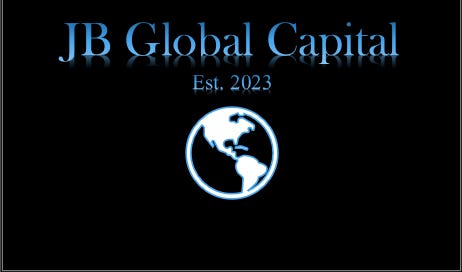The Results
The JB Global Capital Fund returned 0.80% for the first quarter of 2024, dramatically underperforming our two selected benchmarks: the Vanguard Total Stock World Index (7.54%) and the S&P 500 Index (10.20%). This severe underperformance can be attributed to major weakness across our Chinese equities, continued strength of the U.S dollar which creates headwinds for EM equities, and a high portfolio concentration. These factors combined to make for a volatile quarter that ultimately ended, for all intents and purposes, unchanged from the start of the year. While the present results don’t deserve any fanfare, we are encouraged by the underlying developments in our major holdings this quarter and across the macro-economic landscape.
As a reminder, our portfolio consists of three major tranches of investments:
Emerging Market Equities (China, South Korea, Brazil, and Mexico)
U.S Equities
Treasuries and Cash
Finding Value in Emerging Market Equities
As you can see from our portfolio allocation, we are finding tremendous value opportunities in emerging markets. The reasons for this value opportunity are widespread and well known. For example, much of the opportunities in China stem from a combination of economic and geopolitical concerns that have completely overwhelmed the realities of the underlying businesses. At the time of writing, the Hang Sang Index (HSI) hovers at 2006 levels, leaving long-term equity investors with no returns for nearly two decades, all while China’s real GDP grew from $2.7 Trillion to $17.5 Trillion over the same time period.
Long-Term Optimism and the Stockdale Paradox
When studying the most contrarian investments from history, we must remind ourselves that things often got worse before they got better. Sir John Templeton, when making his famous investments during the start of WW2, had to wait nearly three years before recording any profits. During this time, Templeton exemplified patience and long-term optimism in the face of serious negative influences, both internally and externally. Investing is difficult because decisions and outcomes do not reliably follow in a timely fashion like in other fields. For example, when a baseball pitcher throws the ball and a batter swings, the decision/outcome to swing at the pitch is immediate, you either make contact with the ball or you don’t. Investing is unfortunately not as simple.
A decision can look incorrect in the short-term and correct in the long term.
A decision can look correct in the short-term and incorrect in the long-term.
A decision can look incorrect in both the short-term and long-term and be correct in the very long-term.
So how do we judge our own investment decisions if we cannot rely on a timely outcome? The answer is valuation. If our estimate of the intrinsic value of a business goes down, then it is clear to us that we have made a mistake in our initial purchase. Notice how this is different from “if the stock price falls after our initial purchase, it was a mistake.” This practice conditions us to focus on business results rather than stock price movements.
The Stockdale Paradox was first introduced by Jim Collins in his book Good to Great, and essentially says you must never confuse the belief that you will prevail in the end with the discipline to confront the most brutal facts of your current reality. This message provides two important lessons for us as investors:
Long-Term Optimism: If history has taught us anything it is that the optimists are eventually proven right. No matter how much adversity we as a people go through (war, disease, corruption, turmoil), eventually humans overcome and achieve a higher quality of life than in the past. A middle-class American today has a higher quality of life than John Rockefeller enjoyed when he was the wealthiest American in 1900. We, as optimists, believe that improvements to the standard quality of life will continue over the next century for the same fundamental reasons it has been true up to this point.
Confronting Reality: The reality of investing is that no one knows the future, therefore every decision must be made with credence to this fact. As uncertainty is embedded in the investing process, we need to organize a resilient portfolio that can withstand extreme volatility. Being able to withstand, and in some cases benefit from, volatility from a financial and psychological standpoint is essential to outperformance.
The Portfolio
Since inception, we have made 16 investments in 7 industries as classified by Morningstar. While the investments span throughout various sectors, there is material concentration in the sectors of internet retail, financial services, and cloud computing. There is also a geographical concentration in Brazil and China. We anticipate high volatility in the fund due to portfolio concentration, emerging market risk, and a contrarian investment strategy. We would like to thank our partners and readers for their continued support.
Until next time,
Jack Beiro, MBA
JB Global Capital
The information contained herein represents the author’s opinion and is for informational purposes only. Nothing in this newsletter should be construed as legal, tax, investment, or financial advice. No opinion expressed by the author should be construed as a specific inducement to make a particular investment or follow a particular strategy. The author may hold positions in securities mentioned in the newsletter and may buy or sell securities at any time. The author may express opinions based on information he considers reliable, but no guarantee or warranty is made with respect to such information’s completeness or accuracy, and the author is under no obligation to update or correct any information provided. Please consult your own financial or investment advisor before acting on any information provided herein.




